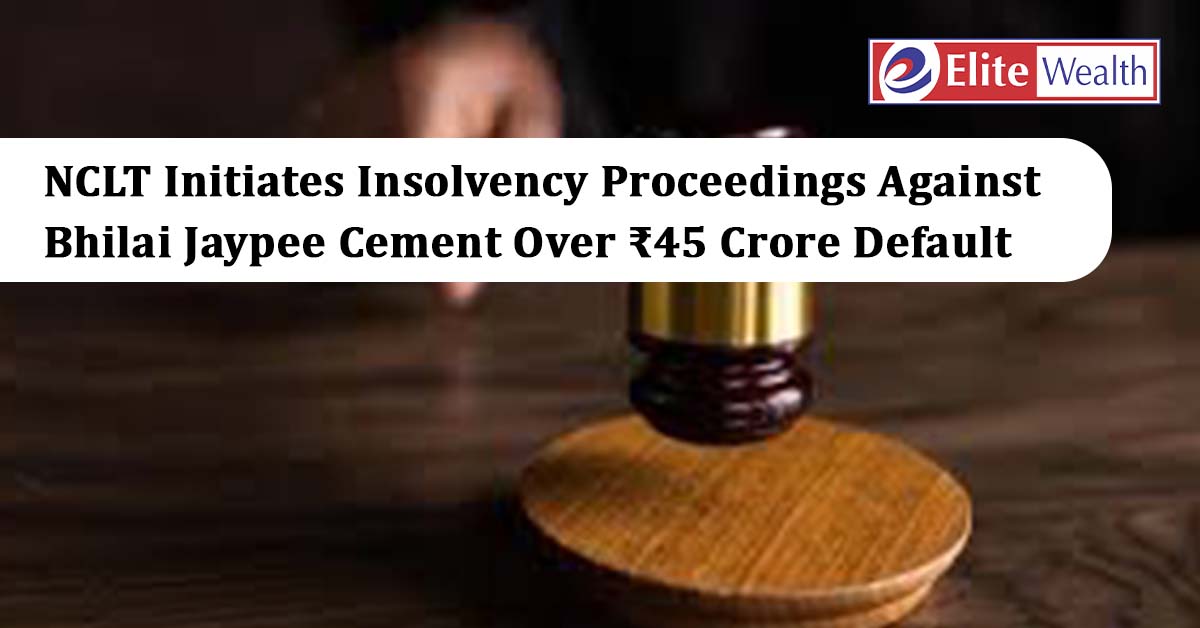
The National Company Law Tribunal (NCLT) has ordered the commencement of insolvency proceedings against Bhilai Jaypee Cement, a subsidiary of the financially stressed Jaiprakash Associates Limited (JAL), following a default of ₹45 crore. The decision by the Cuttack bench of NCLT comes after admitting a petition filed by the company’s operational creditor, Sidhgiri Holdings Pvt Ltd, which claimed unpaid dues for coal supplied to Bhilai Jaypee Cement.
A two-member NCLT bench, comprising Members Deep Chandra Joshi and Banwari Lal Meena, also appointed an interim resolution professional (IRP), effectively suspending the company’s board and imposing a moratorium on asset encumbrances, sales, and civil suits in line with the Insolvency and Bankruptcy Code (IBC). The tribunal noted, “We are inclined to hold that there exists an outstanding operational debt, a default, and accordingly the present application under Section 9 of the Code… for initiating CIRP of Bhilai Jaypee Cement is allowed and the corporate debtor is admitted.”
The dispute stems from three coal purchase orders, each for 2,000 metric tonnes, issued between September 2021 and June 2022, totaling 6,000 MT. Under the purchase agreements, payments were due 15 days post-delivery. Sidhgiri Holdings raised multiple invoices during this period, but Bhilai Jaypee Cement reportedly made only partial payments. On June 22, 2024, the supplier issued a statutory demand notice under the IBC for ₹45.40 crore, including ₹30.08 crore as principal and ₹15.32 crore as interest at 24% per annum. With no satisfactory response, Sidhgiri Holdings filed the insolvency plea under Section 9 of the IBC.
Bhilai Jaypee Cement contested the petition, arguing that it was solvent and the plea was filed solely for recovery purposes, contravening the objectives of the IBC. The company further claimed that Sidhgiri Holdings failed to provide necessary documentation, including certificates from financial institutions, invoices, e-way bills, GSTR forms, ledger entries, and bank statements.
However, the NCLT found that the cement maker did not dispute the receipt of coal or the authenticity of invoices presented by Sidhgiri Holdings. The tribunal observed that Bhilai Jaypee Cement neither challenged the existence of debt nor the amount owed, and acknowledged receipt of the GST invoices issued by the supplier. The bench further stated that the claims regarding Section 63 of the BSA, 2023, were untenable, given the clear establishment of debt through invoices and the company’s acceptance of them.
This insolvency case adds another layer of complexity to the financial troubles of Jaiprakash Associates Limited, whose parent company JAL is already undergoing a Corporate Insolvency Resolution Process (CIRP). In that ongoing process, Vedanta emerged as the successful bidder with a ₹17,000 crore offer, surpassing a competing bid from the Adani Group.
With Bhilai Jaypee Cement now under the CIRP framework, the resolution process will focus on protecting creditor interests, restructuring operations, and determining potential buyers or investors, while maintaining the company’s business continuity under regulatory oversight. Analysts note that the ongoing insolvency proceedings against JAL and its subsidiaries underscore the challenges faced by highly leveraged infrastructure and cement conglomerates in India’s current economic environment.
The NCLT’s ruling against Bhilai Jaypee Cement signals a strict enforcement of operational debt recovery under IBC, emphasizing that even solvent companies cannot evade statutory obligations toward suppliers and creditors. This case may set a precedent for other operational creditors seeking to enforce payments against subsidiaries of large corporate groups in India.
Disclaimer:
This article is intended solely for educational and informational purposes. The securities or companies mentioned are provided as examples and should not be considered as recommendations. Nothing contained herein constitutes personal financial advice or investment recommendations. Readers are advised to conduct their own research and consult a qualified financial advisor before making any investment decisions.
Investments in securities markets are subject to market risks. Please read all related documents carefully before investing.


